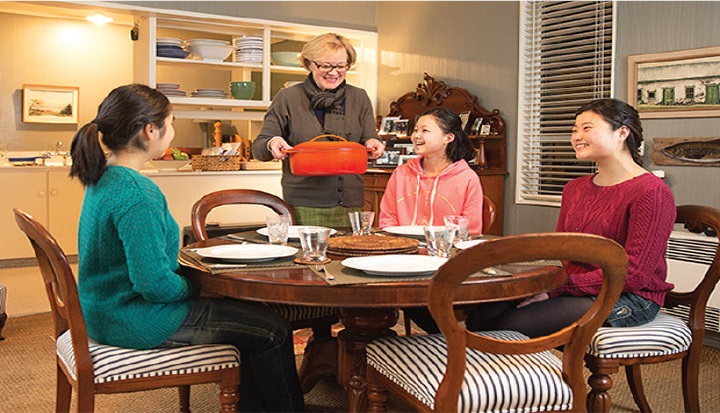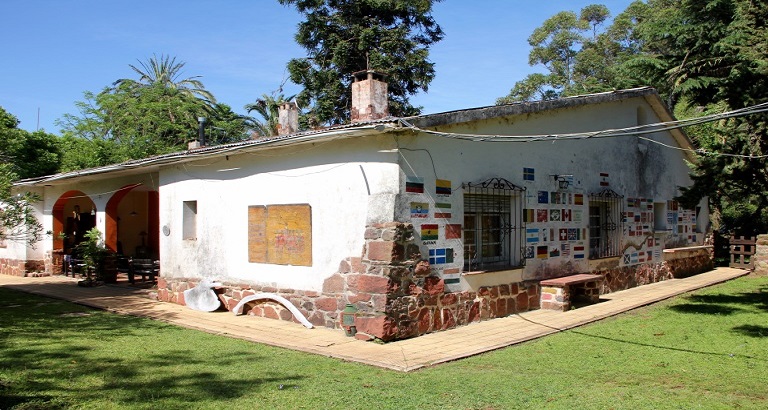So what’s better for you on your study abroad trip (séjour linguistique) – home-stay family or living in a residence?
You want to make the most of your time and money, and learn as much of the language as possible, but without losing freedom or being treated like a teenager again. So what’s it to be?
It all depends on who you ask…If you ask a teacher they’re going to say that living in a home-stay family is better for learning English.
Making friends is an important part of the study broad program
If you ask someone who’s been away with a a massive chain of schools who can carry a 20% dissatisfaction rate because they are so big – we won’t say who – and had a horrendous experience, then they’re going to say that a residence is better.
In fact, as usual, and somewhat boringly, both are right. If you’re lucky, because it is about luck, and you get what every body wants; a fantastic family who are interesting and interested, who eat dinner with you and have things to talk about, give you a large room with your own bathroom, have a pool, as well as a gorgeous, willing and appropriate son/ daughter/both (depending on your persuasion/level of sobriety) and live about 10 minutes walk from the school, then the whole thing is going to rock. You’re going to have a great time, be motivated and learn a lot.
But how many people actually live like this – and accept foreign students? You’ve got to be realistic.
But this does happen. I know a guy who went to Australia, didn’t want to stay at first but ended up getting a part-time job with his home stay father, making Australian friends because of it and learning more English than he would have done just going to school or by being in residence. In Berkeley, one student ended up in a room bigger than his flat, with a view over the bay, a swimming pool and a grand piano – plus they were lawyers, which he was, too.
Enjoy your time and experience your environment
The problem is, you never really know who you are going to end up with. You’re an 18 year old woman, you go off to Costa Rica with an approved agency and the first thing that happens when you arrive in the family, is that the severely religious father starts going through your suitcase and removing all your underwear because it somehow breeches some kind of religious code of un-sexiness, then you know you’re in trouble. (Oh yes, I know someone that happened to also!)
Neither do you want the equally undermining families that do nothing wrong but nothing good either, offering the bare minimum; providing room and board but never being there to talk to you, know you or be, well, a family.
These are worst case scenarios, but if you’re paying decent money to go to a language school to finally crack a language so that later on you can get a job and use it, you don’t need those kind of headaches.
The thing is when you leave home, regardless of whether you’ve organized it yourself or through and agency you just don’t know who you will end up with.
This is where the school – and the agency you choose who picked the school, come into play. A good school will always be monitoring the contentment factor of their students in the families, checking the families, visiting. If there’s a problem, then a good school will ditch the family. And if those problems happen while you’re there, they’ll change you as quickly as possible.
Residences then, have started to be seen as the best place to go. More independence and freedom, younger, a greater possibility of hooking up. All of which, generally, is true. Except that in a residence it’s very likely that you will end up speaking your mother tongue to the students already there, like Americans and English in Spain, or that if you do manage to speak Spanish around the place, it will be American Spanish or French Spanish etc etc as you never get the chance to speak to native users. What’s the problem with this? Bad accents as models, limited vocabulary and limited (and more-often-than-not incorrect) grammar means limited learning.
Conversing with friends is an important part in learning language
Residences do have a lot to offer, but as they don’t usually offer meals, or the meal plan is extra, they can be expensive in comparison to home stay families. You might not want to be forced into using the crap cooking facilities, or obliged to use a shared, boarding school-style bathroom either. Plus, because they are rarely owned by the school, the school itself has little control over what goes on, if something goes wrong… like a student I know who got into a fight and a large ornamental mirror got broken. Big bill, that one – and the school could do little to help. Then of course, there’s the constant movement in and out of students, and other problems of humanity together, like theft, which are less likely to happen with a family. But hey, you do get the full-on student experience, and language school is not university. You’ve got to do some work, but it’s kinda hard to fail.
In the end it’s up to you. You pay your money and you make your choice. There are other alternatives, like schools who have their own student flats available or if you’re lucky, staying with family.
Conclusion
Generally, what we suggest is that for short stays, 3 weeks or so, a residence is fine. If you’re really set on it and you’re planning on being at school for 3 months, renew monthly. We also quite like the idea for longer stays of booking 4 or 5 weeks with a family then checking it out once there. There are often flat-shares going as people leave the school, but this can also depend on the country and it’s culture, but often we find people like the idea of being at home and having dinner ready… while still retaining a decent amount of freedom.
 BESTCITYTRIPS
BESTCITYTRIPS




